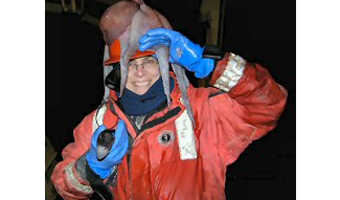Dr. Lisa Crockett, Professor of Biological Sciences, and member faculty of the Molecular and Cellular Biology program, is mentioned in a Virginia Tech story on “Research team heads to Antarctic to get icy insight into how brain adapts to temperature change.”
At the southernmost extremes of the planet lives a fish different from all other vertebrates on Earth.
Aptly nicknamed the icefish, the notothenioid lives in such cold temperatures that antifreeze runs through its veins – literally. But the Antarctic Ocean is warming, and icefishes are in danger.
Now, a team of scientists with the Virginia Tech Carilion Research Institute will travel to Antarctica to find out, for the first time, how rising temperatures affect the brains and hearts of the icefish – and what it means for the rest of the world.
“Icefishes are adapted to survive and thrive in water that’s colder than ice,” said Michael Friedlander, the executive director of the Virginia Tech Carilion Research Institute, whose laboratory will oversee brain research during the expedition. “The temperature is warming, though, and even the subtle elevations seem to be having a profound effect on life in the Southern Ocean.”…
Friedlander’s team is working in collaboration with scientists from the University of Alaska at Fairbanks and Ohio University, who will study the icefishes’ cardiovascular systems. Elizabeth Crockett, an associate professor of biological sciences at Ohio University and the lead investigator on the National Science Foundation grant funding the expedition, was a graduate student mentored by Bruce Sidell, another graduate student in Prosser’s laboratory who went on to become a professor of marine sciences at the University of Maine. She considers Friedlander an academic uncle, and his continued research made him a logical choice when building the research collaboration.




















Comments